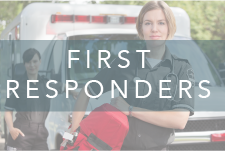The Stigma of Heroism in First Responders
- Jul 12, 2021
- 6 min read
Updated: Oct 21, 2025

You've landed in the right place to understand the unique challenges faced by first responders. We'll explore the complex balance between their heroic public identity and their personal mental and emotional needs.
How can first responders manage the pressure of their heroic identity with their personal needs?
First responders can manage this pressure by actively separating their professional role from their personal life. It's crucial for them to take time off, pursue hobbies, and build an identity outside of their career to maintain a healthy mental state and overall well-being.
There's much more to learn about this important topic, including how to overcome guilt and workplace culture. Continue reading to discover more strategies for balancing a demanding career with personal well-being.
Balancing Strength and Needs
First responders are touted as the protectors of others, the bastions of strength and reliability, and the pinnacles of heroism. While all of this is true, it can be challenging to balance all of these titles and expectations with being a “normal” person. First responders—whether police officers upholding the law,
EMTs responding to dire situations, or firefighters braving the impossible—are also people with their own mental and emotional needs and deal with the stigma of heroism. It is important for them to learn to balance these notions with a degree of self-care and even distance themselves from the expected heroism that has been imparted onto them.
The Stigma of Heroism: Confronting an Ascribed Identity
First responders are in a unique position that their career path is often tied to an expectation of their character. Many first responders are often considered selfless, law-abiding, caring people who have garnered the strength and will to help those around them, from an individual in need to entire communities at large.
Honoring first responders can come in various forms, each of which reinforces this notion of an ascribed identity. However, it can also be paramount for a first responder’s health to occasionally distance themselves from these notions and allow other aspects of their identity to flourish or find some other form of mental respite from having to uphold such a lofty expectation.
Regardless of the intention behind honoring a first responder for their service and sacrifice, those in a stressful line of work can benefit from separating their identity as a servant of a community and put their needs as a person before their ascribed.

Learning to Take Time for Yourself
Even the idea that a first responder can take time off for themselves can be a significant hurdle on its own. There can be a number of reasons that an individual may find such a notion difficult, even outside of societal expectations.
Peers and superiors may continue to reinforce the notion that one’s line of work is intrinsically tied to their expectations and identity, and insist that time off isn’t necessary. It may also be difficult to take much time off due to the workplace culture that is prevalent throughout the entirety of the United States.
However, there can also be self-imposed reasons why taking time off can be difficult, even if it may be entirely necessary to help rejuvenate one’s mental state and process the stressful experiences from workplace events. Guilt can be a major reason why taking time off can be difficult under the idea that if someone isn’t available at all times to act, protect, or serve a community, then any transpiring disasters are then the individual’s fault, regardless of how realistic such a notion may be.
The expectation to always be an agent of service can overcome other aspects of one’s identity and needs in the process as expectations are continuously thrust upon them. However, such notions are an active reason why taking this time off can be essential.
The toll that feelings of guilt, or the weight of expectation, can take on an individual can be monumental. Breaks are not just necessary for one’s own mental health and rest but are also crucial to maintain a healthy mindset and decision-making skills while in the field.
Taking Time to Explore Identity
Taking some time to explore one’s identity outside of the workplace or beyond the definition of a first responder can be necessary for finding a healthy balance for one’s wellbeing. For some, this can mean taking a vacation and spending time with family, while others may need to use this time to learn to separate their work life from their personal goals.
By no means does this notion need to discount one’s status as a first responder, but rather is intended to build upon one’s identity to accept both personal and professionals goals, interests, and traits. Getting off the clock and taking time to engage in a hobby like music, art, or having a movie night with loved ones can be the kind of practice necessary to begin exploring balance in one’s life.
Practicing other hobbies and allowing oneself to detach from work and just go mini-golfing with friends is an essential part of balancing expectations while still building an identity outside of ascribed characteristics.
It is possible to be a first responder, an artist, and a tutor to one’s children. Taking time to decompress and explore one’s own identity off the clock is necessary to ensure a fulfilling balance between work expectations, personal development, and a healthy mental state.
Frequently Ask Questions:
• What is the "stigma of heroism" for first responders?
The stigma of heroism refers to the expectation that a first responder's professional role is tied to their personal identity, often leading to them being seen as selfless and constantly ready to serve.
• Why is it difficult for some first responders to take time off?
Taking time off can be difficult for various reasons, including workplace culture, peer pressure, and self-imposed guilt that can arise from not being available at all times.
• Why is taking time for self-care important for first responders?
Taking time for self-care is crucial for first responders to rejuvenate their mental state, process stressful experiences, and maintain healthy decision-making skills while on the job.
• What does it mean for a first responder to explore their identity outside of work?
Exploring one's identity outside of work means engaging in activities and interests like hobbies, spending time with family, or pursuing personal goals that are separate from their professional duties.
• Can a first responder still be a hero while prioritizing their personal life?
Yes, it is possible for a first responder to be both a dedicated professional and a person with a fulfilling personal life. Balancing both aspects of their identity is necessary for their well-being.
For any first responder struggling to balance their identity with the immense pressure of their work, we want you to know you're not alone. Our team at Chateau Health and Wellness is here to support you. We understand the unique challenges you face and have created a space where you can focus on your well-being without judgment. We encourage you to take that vital first step toward prioritizing your mental and emotional health. Contact us today at (435) 222-5225 to discover how we can help you navigate these challenges and find a healthy balance between your heroic service and your personal needs.

About The Author
Ben Pearson, LCSW - Clinical Director
With 19 years of experience, Ben Pearson specializes in adolescent and family therapy, de-escalation, and high-risk interventions. As a former Clinical Director of an intensive outpatient program, he played a key role in clinical interventions and group therapy. With 15+ years in wilderness treatment and over a decade as a clinician, Ben has helped countless individuals and families navigate mental health and recovery challenges.
Danny Warner, CEO of Chateau Health and Wellness
Brings a wealth of experience in business operations, strategic alliances, and turnaround management, with prior leadership roles at Mediconnect Global, Klever Marketing, and WO Investing, Inc. A graduate of Brigham Young University in Economics and History, Danny has a proven track record of delivering results across diverse industries. His most transformative role, however, was as a trail walker and counselor for troubled teens at the Anasazi Foundation, where he directly impacted young lives, a personal commitment to transformation that now drives his leadership at Chateau.
Austin Pederson, Executive Director of Chateau Health and Wellness
Brings over eight years of experience revolutionizing mental health and substance abuse treatment through compassionate care and innovative business strategies. Inspired by his own recovery journey, Austin has developed impactful programs tailored to individuals facing trauma and stress while fostering comprehensive support systems that prioritize holistic wellness. His empathetic leadership extends to educating and assisting families, ensuring lasting recovery for clients and their loved ones.









